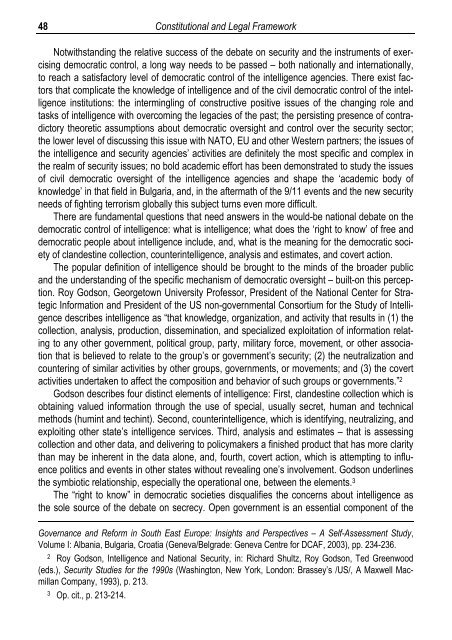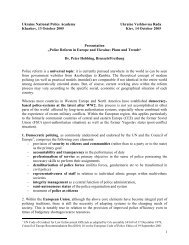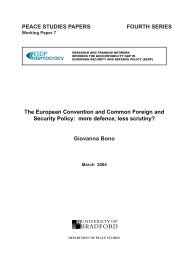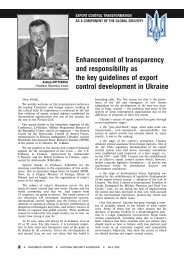Civil-Military Relations and Democratic Control of the Security Sector
Civil-Military Relations and Democratic Control of the Security Sector
Civil-Military Relations and Democratic Control of the Security Sector
Create successful ePaper yourself
Turn your PDF publications into a flip-book with our unique Google optimized e-Paper software.
48<br />
Constitutional <strong>and</strong> Legal Framework<br />
Notwithst<strong>and</strong>ing <strong>the</strong> relative success <strong>of</strong> <strong>the</strong> debate on security <strong>and</strong> <strong>the</strong> instruments <strong>of</strong> exercising<br />
democratic control, a long way needs to be passed – both nationally <strong>and</strong> internationally,<br />
to reach a satisfactory level <strong>of</strong> democratic control <strong>of</strong> <strong>the</strong> intelligence agencies. There exist factors<br />
that complicate <strong>the</strong> knowledge <strong>of</strong> intelligence <strong>and</strong> <strong>of</strong> <strong>the</strong> civil democratic control <strong>of</strong> <strong>the</strong> intelligence<br />
institutions: <strong>the</strong> intermingling <strong>of</strong> constructive positive issues <strong>of</strong> <strong>the</strong> changing role <strong>and</strong><br />
tasks <strong>of</strong> intelligence with overcoming <strong>the</strong> legacies <strong>of</strong> <strong>the</strong> past; <strong>the</strong> persisting presence <strong>of</strong> contradictory<br />
<strong>the</strong>oretic assumptions about democratic oversight <strong>and</strong> control over <strong>the</strong> security sector;<br />
<strong>the</strong> lower level <strong>of</strong> discussing this issue with NATO, EU <strong>and</strong> o<strong>the</strong>r Western partners; <strong>the</strong> issues <strong>of</strong><br />
<strong>the</strong> intelligence <strong>and</strong> security agencies’ activities are definitely <strong>the</strong> most specific <strong>and</strong> complex in<br />
<strong>the</strong> realm <strong>of</strong> security issues; no bold academic effort has been demonstrated to study <strong>the</strong> issues<br />
<strong>of</strong> civil democratic oversight <strong>of</strong> <strong>the</strong> intelligence agencies <strong>and</strong> shape <strong>the</strong> ‘academic body <strong>of</strong><br />
knowledge’ in that field in Bulgaria, <strong>and</strong>, in <strong>the</strong> aftermath <strong>of</strong> <strong>the</strong> 9/11 events <strong>and</strong> <strong>the</strong> new security<br />
needs <strong>of</strong> fighting terrorism globally this subject turns even more difficult.<br />
There are fundamental questions that need answers in <strong>the</strong> would-be national debate on <strong>the</strong><br />
democratic control <strong>of</strong> intelligence: what is intelligence; what does <strong>the</strong> ‘right to know’ <strong>of</strong> free <strong>and</strong><br />
democratic people about intelligence include, <strong>and</strong>, what is <strong>the</strong> meaning for <strong>the</strong> democratic society<br />
<strong>of</strong> cl<strong>and</strong>estine collection, counterintelligence, analysis <strong>and</strong> estimates, <strong>and</strong> covert action.<br />
The popular definition <strong>of</strong> intelligence should be brought to <strong>the</strong> minds <strong>of</strong> <strong>the</strong> broader public<br />
<strong>and</strong> <strong>the</strong> underst<strong>and</strong>ing <strong>of</strong> <strong>the</strong> specific mechanism <strong>of</strong> democratic oversight – built-on this perception.<br />
Roy Godson, Georgetown University Pr<strong>of</strong>essor, President <strong>of</strong> <strong>the</strong> National Center for Strategic<br />
Information <strong>and</strong> President <strong>of</strong> <strong>the</strong> US non-governmental Consortium for <strong>the</strong> Study <strong>of</strong> Intelligence<br />
describes intelligence as “that knowledge, organization, <strong>and</strong> activity that results in (1) <strong>the</strong><br />
collection, analysis, production, dissemination, <strong>and</strong> specialized exploitation <strong>of</strong> information relating<br />
to any o<strong>the</strong>r government, political group, party, military force, movement, or o<strong>the</strong>r association<br />
that is believed to relate to <strong>the</strong> group’s or government’s security; (2) <strong>the</strong> neutralization <strong>and</strong><br />
countering <strong>of</strong> similar activities by o<strong>the</strong>r groups, governments, or movements; <strong>and</strong> (3) <strong>the</strong> covert<br />
activities undertaken to affect <strong>the</strong> composition <strong>and</strong> behavior <strong>of</strong> such groups or governments.” 2<br />
Godson describes four distinct elements <strong>of</strong> intelligence: First, cl<strong>and</strong>estine collection which is<br />
obtaining valued information through <strong>the</strong> use <strong>of</strong> special, usually secret, human <strong>and</strong> technical<br />
methods (humint <strong>and</strong> techint). Second, counterintelligence, which is identifying, neutralizing, <strong>and</strong><br />
exploiting o<strong>the</strong>r state’s intelligence services. Third, analysis <strong>and</strong> estimates – that is assessing<br />
collection <strong>and</strong> o<strong>the</strong>r data, <strong>and</strong> delivering to policymakers a finished product that has more clarity<br />
than may be inherent in <strong>the</strong> data alone, <strong>and</strong>, fourth, covert action, which is attempting to influence<br />
politics <strong>and</strong> events in o<strong>the</strong>r states without revealing one’s involvement. Godson underlines<br />
<strong>the</strong> symbiotic relationship, especially <strong>the</strong> operational one, between <strong>the</strong> elements. 3<br />
The “right to know” in democratic societies disqualifies <strong>the</strong> concerns about intelligence as<br />
<strong>the</strong> sole source <strong>of</strong> <strong>the</strong> debate on secrecy. Open government is an essential component <strong>of</strong> <strong>the</strong><br />
Governance <strong>and</strong> Reform in South East Europe: Insights <strong>and</strong> Perspectives – A Self-Assessment Study,<br />
Volume I: Albania, Bulgaria, Croatia (Geneva/Belgrade: Geneva Centre for DCAF, 2003), pp. 234-236.<br />
2 Roy Godson, Intelligence <strong>and</strong> National <strong>Security</strong>, in: Richard Shultz, Roy Godson, Ted Greenwood<br />
(eds.), <strong>Security</strong> Studies for <strong>the</strong> 1990s (Washington, New York, London: Brassey’s /US/, A Maxwell Macmillan<br />
Company, 1993), p. 213.<br />
3 Op. cit., p. 213-214.

















